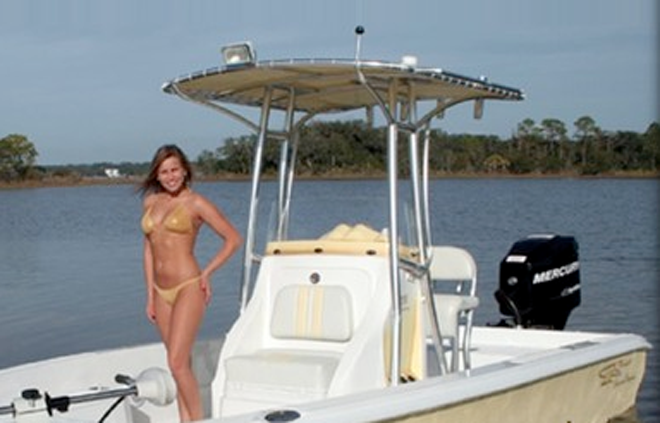We are officially in boat show season and as a result thousands of people will be searching for their perfect vessel, myself included
By Grant Gisondo / Part Two
Buying a boat from a broker
[dropcap]M[/dropcap]any people equate boat brokers to car salesmen on steroids. A boat broker is selling a product that is usually far more expensive than a car. Brokers are famous for buying you lunch, cocktails, taking you for rides on boats you can never afford. My favorite is the phone call from a broker: “I found the perfect boat for you.”

A boat show is a great way to source out your boating needs. The Ft. Lauderdale Boat Show has it all.
I don’t want anyone to think that I’m against brokers. I have several very good friends that are boat brokers, I enjoy their company, fishing with them, having dinner with them and spending time with them. Most of them are honest, upfront and excellent people. But not all of them.
Here’s what you need to know. Brokers get a commission from the sale of the boat – regardless if it’s new or used. Hence, the more money you spend – the more money the broker gets. Is there anything wrong with that? No. Brokers provide a great service, they put sellers and buyers together with common interests. They work hard, and should be compensated for their efforts. Brokers also take care of all the paperwork, will assist you in getting financing, insurance and basically keep the buyer and seller from negotiating the deal to death. They are the middle man and make buying a boat much easier. But, the seller knows that they have to pay the brokers commission, so a boat might be priced higher than it should be because there’s a third hand in the cookie jar.
Brokers have to negotiate with both the buyer and seller. They are excellent in “buddying up” with both parties. They’ll make the seller believe an offer is great one even its pretty low. They’ll work the seller down on the price so they can sell faster, and will also make the buyer believe that this boat is the perfect one, but try to get the buyer to spend a bit more money. Is it helpful to have a middle man pushing both the buyer and the seller? It can be. Do brokers actually make a living doing this? Yes they do. In fact, I know several brokers that make a pretty penny.
Whether you use a broker or keep things directly with the parties, make no mistake that in the end it’s all about money. Buying or selling a boat is not a friendly transaction, it is not about the care free boating life style. It is a hardcore business decision and should be conducted like any financial decision with knowledge, clear objectives and honesty.
Just like many of you, I am selling my current boat and in the market for a “new to me” boat. This was not an easy decision. Looking at boats, reviewing numbers and being both a buyer and seller is not an easy task. It is time consuming, tiring and at times down right frustrating. I prefer to have very clear objectives when buying a boat, which means my research and boat buying criteria can be very useful for you.
Use the six step process
Step one: Get real! I review all my finances and determine the amount of money I can afford for a boat. Then I head to the bank and get pre-approved for the amount of money I want to spend. I don’t even bother looking at boats that I cannot afford. It’s a waste of time and unrealistic. With pre-approval I can close on a boat quite quickly, which means the seller will get his money fast and will usually take a lower price. Once my finances are in order I start researching. I look within my price point what I can buy. Once I narrow down a few manufactures I do more research. Does these boats fit my needs? I research the specific model and make of the boat to death looking at things like re-call notices, resale value etc. Online forums are excellent places to get in touch with other boat owners and ask them questions. Once I narrow down a make and model I research to see what is out there. I’m specially looking for the high and low prices and the ranges these boats are actually selling for.
head to the bank and get pre-approved for the amount of money I want to spend. I don’t even bother looking at boats that I cannot afford. It’s a waste of time and unrealistic. With pre-approval I can close on a boat quite quickly, which means the seller will get his money fast and will usually take a lower price. Once my finances are in order I start researching. I look within my price point what I can buy. Once I narrow down a few manufactures I do more research. Does these boats fit my needs? I research the specific model and make of the boat to death looking at things like re-call notices, resale value etc. Online forums are excellent places to get in touch with other boat owners and ask them questions. Once I narrow down a make and model I research to see what is out there. I’m specially looking for the high and low prices and the ranges these boats are actually selling for.
Step two: Once you have a few listings that you’re am interested in, call the owners or brokers. I do not like email for this initial contact. You can tell a lot about a seller by the information he gives you on the phone. I always ask “are you negotiable on the price” if the answer is no, I simply move on unless I know one hundred percent I am getting the deal of a lifetime. However, be aware if a boat is priced much lower than others in the market there IS a reason. Once I have a few boats that fit my criteria and sellers that are negotiable I schedule appointments to look at the boats.
Step three: Meet the seller and let them sell me the boat. Let the seller show you all the features, walk around the boat etc. Typically I am taking notes at this point. Once the seller is done giving me his tour of the boat, I say something along the lines of. I am interested in buying this boat, but would like the opportunity to either come back or now if you have time spend about two to three hours on the boat alone going through the details. If the seller will not leave you on the boat that can be understandable. What I usually say is, I need to really look over this boat in detail. I cannot be rushed. If you want to stay with me that is totally understandable but its going to take me two to three hours. Usually the seller will either leave you and come back to check on you or they will stay close by. Either way is fine.
Step four: Go through the boat slowly, take a lot of notes and take a lot of pictures. Depending on the size of the  boat this can take two to six hours. I do not rush. I bring snacks with me and water. I really take my time and try to get a feel for the boat. I look at everything and turn everything on and off. As I am doing this I make a list of questions that I wish to ask the seller. After my through review I meet with the seller again. I ask all my questions and if all seems ok request a sea trial either the same day or in the near future.
boat this can take two to six hours. I do not rush. I bring snacks with me and water. I really take my time and try to get a feel for the boat. I look at everything and turn everything on and off. As I am doing this I make a list of questions that I wish to ask the seller. After my through review I meet with the seller again. I ask all my questions and if all seems ok request a sea trial either the same day or in the near future.
Step five: Conduct a sea trial with a mechanic. I am not a mechanic and do not claim to be one. My mechanic tests everything again. I mean everything. Again I am taking notes. While the mechanic is focusing on the technical things I am focusing on the boat ride, comfort etc. After the trial I usually take the mechanic to lunch and we talk about everything. Repairs that are needed, condition of the boat and engines, cost of repairs, cost of things I may want to change etc.
Step six: Armed with all the information and the mechanic report, the seller and I have a meeting. If all has gone well to this point, I may make an offer, I may ask more questions or simply say thank you very much, but I don’t think this is the boat for me. Usually If I am at this stage I’m very serious about the boat. Either the seller will accept my offer, decline it or make a counter offer. Either way its either a “go” or a “no go” one important thing is do not be afraid to walk away from a deal that is not right for you.
gone well to this point, I may make an offer, I may ask more questions or simply say thank you very much, but I don’t think this is the boat for me. Usually If I am at this stage I’m very serious about the boat. Either the seller will accept my offer, decline it or make a counter offer. Either way its either a “go” or a “no go” one important thing is do not be afraid to walk away from a deal that is not right for you.
There are many boats out there for sale, many buyers and many sellers. No deal is truly one of a kind or perfect. Take your time, gain as much knowledge as possible and enjoy your new boat or enjoy having sold your boat.



